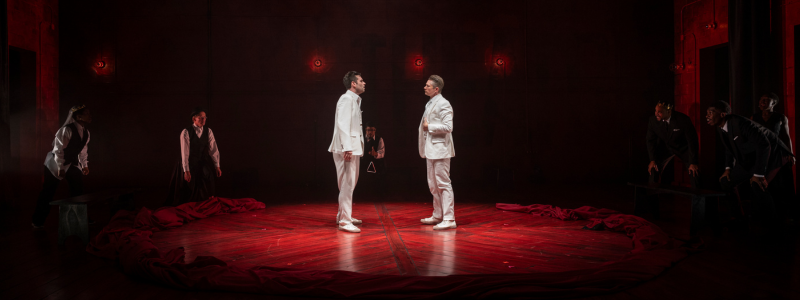Glossary

Check out this list of definitions and references compiled by Dramaturg Marissa Fenley to enhance your understanding of Tom Stoppard’s Rosencrantz and Guildenstern Are Dead.
| WORD/PHRASE | DEFINITION |
|---|---|
| Admonishing | (adj) Chastising or reprimanding |
| Amnesiac | (n) A person with amnesia: suffering a partial or total loss of memory |
| Appurtenance | (n, Shakespeare) a subordinate part, an ancillary feature |
| Arras | (n) A tapestry hung as decoration |
| Avuncular | (adj) Uncle-like |
| Decadence | (adj) Excessive indulgence in pleasure or luxury. A decline or decay in moral standards. Also an art movement that embraced fantasy, excess, pleasure and artificiality. Oscar Wilde, a major influence on Stoppard and a proponent of Decadence, defined art as “the telling of beautiful untrue things.” |
| Denouement | (adj) Excessive indulgence in pleasure or luxury. A decline or decay in moral standards. Also an art movement that embraced fantasy, excess, pleasure and artificiality. Oscar Wilde, a major influence on Stoppard and a proponent of Decadence, defined art as “the telling of beautiful untrue things.” |
| Derisively | (adv) Expressing contempt or ridicule |
| Disport | (v) To amuse oneself, to frolic, to engage in lively entertainment |
| Expiate | (v) To atone, do penance, make amends for |
| Galvanize | (v) To stimulate or excite as if by electric shock |
| Grotesque | (adj) A distorted, exaggerated or imbalanced figure; an impossible absurdity |
| Handsaw | (n, Shakespeare) A corruption for heronsaw, which is a type of heron. Shakespeare was likely referring to a hunter’s ability to see while staring directly into the sun (which he would need to do if birds were flying south with the wind). However, the expression “tell a hawk from a handsaw” has come to idiomatically refer to the ability to be discerning. |
| Just desserts | (n) A deserved punishment |
| Law of Averages | (n) Not an actual “law” but a belief that after a time, an event will occur based on its probability. This often leads to the “gambler’s fallacy” which assumes that because an event hasn’t occurred recently, it will soon. While there is a real theorem in statistics that can predict the average occurrence of an event over a long period of time based on its probability, it has very little application for shorter-term periods. While one might assume that a coin flipped 100 times will come up heads 50 times and tails 50 times, there is actually only an 8% chance of this happening. Fwiw, a coin coming up heads 92 times has a probability of approximately 0.0000000000000000000000000002 or 1 in 5000 trillion trillion. However any given sequence of heads and tails 92 has the same probability of occurring. A coin coming up heads 92 times is no less likely than any other sequence. |
| Law of Diminishing Returns | (n) This law states that in a process of production, if you expand an aspect production (for example, increase your workforce from 1 to 50 workers), you will, at some point of expansion, no longer increase output (the number of products sold) at a greater degree than the increased input (labor). In other words, your returns will diminish with each level of expansion. While this number will approach zero, it will never reach a negative value. |
| Love | (n, tennis) A score of zero. One theory is that it comes from an English mispronunciations for the French “l’ouef” which means “egg” because a zero looks like the shape of an egg. Another theory is that if you score a zero, you are playing for the love of the game, not to win. |
| Lugubrious | (adj) Excessively mournful, affectedly gloomy |
| Matri, Patri, Fratri, Sorori, Uxori | (adj) Prefixes meaning: mother, father, brother, sister, wife |
| Miserly | (adj) To be withholding, sparing with one’s words, laconic |
| Myopia | (n) Short-sightedness |
| Overawed | (adj) To be stunned into silence; to experience a mixture of respect and fear |
| Phlegmatic | (adj) Not easily excited or moved to emotion; calm, composed |
| Portentous | (adj) Ominous or foreboding; can also mean somber or pompous |
| Protestation | (n) Emphatic objection or complaint |
| The Rape of the Sabine Women | (n) Refers to a myth from Ancient Rome in which Roman men kidnapped women from other cities in the region. “Rape” is usually translated as “kidnapping” or “abduction” rather than sexual assault. This myth was frequently depicted by painters in the Renaissance. |
| Remonstrate | (v) To forcefully protest |
| Retentive | (adj) Able to retain knowledge, having a good memory. Also a play on “anal-retentive” or a Freudian stage of development in which a child becomes fixated with excretory control. Associated with an obsessive and controlling personality. |
| Syllogism | (n) A logical formulation that applies deductive reasoning to arrive at a conclusion. It involves two premises, assumed to be true, in order to arrive at a valid conclusion. A common example of a syllogism is: All men are mortal. Socrates is a man. Therefore, Socrates is mortal. |
| Tragic irony | (n) A form of dramatic irony where a character’s lack of information leads to tragedy |